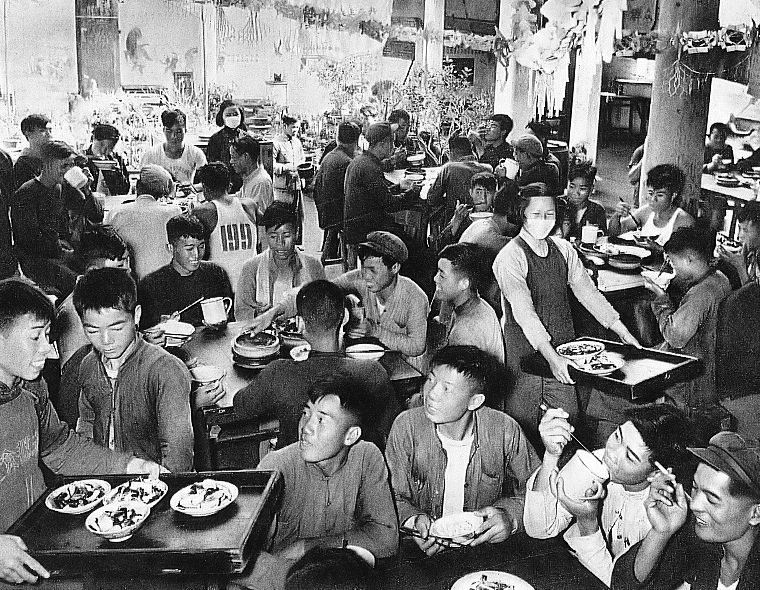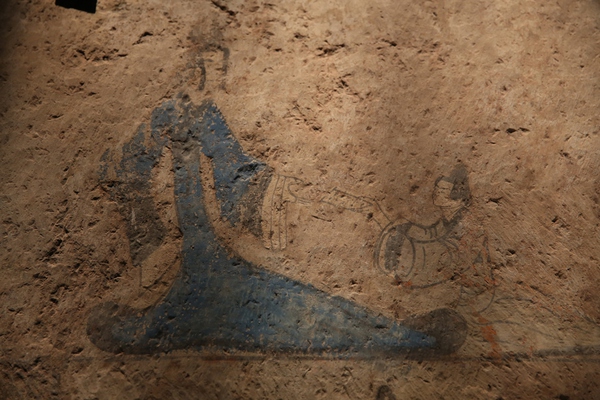|
Wan Li
Wan Li (1 December 1916 – 15 July 2015) was a Chinese Communist revolutionary and politician. During a long administrative career in the People's Republic of China, he served successively as Vice Premier, Chairman of the Standing Committee of the National People's Congress (NPC), and a member of the Chinese Communist Party (CCP) Secretariat and its Politburo.Wan joined the Chinese Communist Party in 1936 and led revolutionary and wartime resistance activities in his native Shandong province. After the founding of the communist state in 1949, Wan served in a series of government ministries, then worked as a member of the municipal leadership in Beijing. He was purged during the Cultural Revolution, but was eventually rehabilitated and returned to work as party chief of Anhui province, where he led the implementation of successful agrarian reforms centered on the household-responsibility system.In the 1980s, Wan became one of the leading moderate reformers in China's top leadersh ... [...More Info...] [...Related Items...] OR: [Wikipedia] [Google] [Baidu] |
Peng Zhen
Peng Zhen (pronounced ; October 12, 1902 – April 26, 1997) was a leading member of the Chinese Communist Party. He led the party organization in Beijing following the victory of the Communists in the Chinese Civil War in 1949, but was purged during the Cultural Revolution for opposing Mao's views on the role of literature in relation to the state. He was rehabilitated under Deng Xiaoping in 1982 along with other 'wrongly accused' officials, and became the inaugural head of the Central Political and Legal Affairs Commission. Biography Born in Houma, Shanxi province, Peng was originally named Fu Maogong (傅懋恭). He joined the Chinese Communist Party (CCP) in 1923 as a founding member of the Shanxi Province CCP. Arrested in 1929, he continued underground political activities while imprisoned. He was released from prison in 1935 and began organizing a resistance movement against the invading Japanese forces. Around the same time, he was appointed the Organization Depa ... [...More Info...] [...Related Items...] OR: [Wikipedia] [Google] [Baidu] |
Politburo Of The Chinese Communist Party
The Politburo of the Chinese Communist Party, formally known as the Political Bureau of the Communist Party of China Central Committee and known as the Central Bureau before 1927, is the decision-making body of the Chinese Communist Party (CCP). Currently, it is a group of 24 top officials who oversee the CCP and headed by the general secretary. Unlike politburos of other Communist parties, power within the Chinese politburo is further centralized in the Politburo Standing Committee, a group of 7 individuals from among the larger Politburo. The Politburo is nominally elected by the Central Committee. In practice, however, scholars of Chinese elite politics believe that the Politburo is a self-perpetuating body, with new members of both the Politburo and its Standing Committee chosen through a series of deliberations by current Politburo members and retired Politburo Standing Committee members. The current and former Politburo members conduct a series of informal straw polls to de ... [...More Info...] [...Related Items...] OR: [Wikipedia] [Google] [Baidu] |
Xi Zhongxun
Xi Zhongxun (15 October 1913 – 24 May 2002) was a Chinese communist revolutionary and a subsequent political official in the People's Republic of China. He is considered to be among the first and second generation of Chinese leadership. The contributions he made to the Chinese communist revolution and the development of the People's Republic, from the founding of Communist guerrilla bases in northwestern China in the 1930s to initiation of economic liberalization in southern China in the 1980s, are numerous and broad. He was known for political moderation and for the setbacks he endured in his career. He was imprisoned and purged several times. His second son is the current General Secretary of the Chinese Communist Party Xi Jinping. Early life and education Xi was born on 15 October 1913, to a land-owning family, in rural Fuping County, Shaanxi. He joined the Chinese Communist Youth League in May 1926 and took part in student demonstrations in the spring of 1928, ... [...More Info...] [...Related Items...] OR: [Wikipedia] [Google] [Baidu] |
People's Commune
The people's commune () was the highest of three administrative levels in rural areas of the People's Republic of China during the period from 1958 to 1983, until they were replaced by townships. Communes, the largest collective units, were divided in turn into production brigades and production teams. The communes had governmental, political, and economic functions during the Cultural Revolution. The people's commune was commonly known for collectivizing living and working practices, especially during the Great Leap Forward. The scale of the commune and its ability to extract income from the rural population enabled commune administrations to invest in large-scale mechanization, infrastructure, and industrial projects. The communes did not, however, meet many of their long-term goals, such as facilitating the construction of socialism in the rural areas, liberating women from housework, and creating sustainable agriculture practices in the countryside. They ranged in number fr ... [...More Info...] [...Related Items...] OR: [Wikipedia] [Google] [Baidu] |
Agrarianism
Agrarianism is a political and social philosophy that has promoted subsistence agriculture, smallholdings, and egalitarianism, with agrarian political parties normally supporting the rights and sustainability of small farmers and poor peasants against the wealthy in society. In highly developed and industrial nations or regions, it can denote use of financial and social incentives for self-sustainability, more community involvement in food production (such as allotment gardens) and smart growth that avoids urban sprawl, and also what many of its advocates contend are risks of human overpopulation; when overpopulation occurs, the available resources become too limited for the entire population to survive comfortably or at all in the long term. Philosophy Some scholars suggest that agrarianism values rural society as superior to urban society and the independent farmer as superior to the paid worker, and sees farming as a way of life that can shape the ideal social values. It s ... [...More Info...] [...Related Items...] OR: [Wikipedia] [Google] [Baidu] |
Re-education Through Labour
Re-education through labor (RTL; ), abbreviated ''laojiao'' () was a system of administrative detention on Mainland China. Active from 1957 to 2013, the system was used to detain persons who were accused of committing minor crimes such as petty theft, prostitution, and trafficking of illegal drugs, as well as political dissidents, petitioners, and Falun Gong followers. It was separated from the much larger ''laogai'' system of prison labor camps. Sentences under re-education through labor were typically for one to three years, with the possibility of an additional one-year extension. They were issued as a form of administrative punishment by police, rather than the judicial system. While they were incarcerated, detainees were frequently subjected to a form of political education. Estimates of the number of RTL detainees on any given year range from 190,000 to two million. In 2013, approximately 350 RTL camps were in operation. On 28 December 2013, the Standing Committee of ... [...More Info...] [...Related Items...] OR: [Wikipedia] [Google] [Baidu] |
Great Hall Of The People
The Great Hall of the People is a state building located at the western edge of Tiananmen Square in Beijing. It is used for legislative and ceremonial activities by the government of the People's Republic of China (PRC) and the ruling Chinese Communist Party. The People's Great Hall functions as the meeting place for the full sessions of the National People's Congress (NPC), the Chinese legislature, which occurs every year during March along with the national session of the Chinese People's Political Consultative Conference (CPPCC), a political advisory body. It is also the meeting place of the National Congress of the Chinese Communist Party, which, since the 12th conference in 1982, has occurred once every five years and the party's Central Committee which meets approximately once a year. The Hall is also used for many special events, including national level meetings of various social and political organizations, large anniversary celebrations, as well as the memorial servic ... [...More Info...] [...Related Items...] OR: [Wikipedia] [Google] [Baidu] |
December 9th Movement
The December 9th Movement () was a mass protest led by students in Beiping (present-day Beijing) on December 9, 1935 to demand that the Chinese government actively resist Japanese aggression. Background After the Japanese Imperial Force occupied Manchuria following the Mukden Incident in 1931, it attempted to follow up with an invasion into northern China. Between June and July 1935, the Chin-Doihara Agreement was negotiated between Japan and the Chinese Kuomintang (KMT) government as a way for the former to gain control of Chahar Province. A puppet state known as " Eastern Hebei Anti-Communist Autonomous Government" was then set up by a Yin Rugeng with Japanese help. In response to the demands by Japan to create a separate regime in Northern China, the KMT government was forced to establish the " Hebei-Chahar Political Council". The Chinese Communists, on the other hand, called for a voluntary mobilization of all Chinese people to resist Japanese aggression in a proclamation ... [...More Info...] [...Related Items...] OR: [Wikipedia] [Google] [Baidu] |
Qufu
Qufu ( ; ) is a city in southwestern Shandong province, East China. It is located about south of the provincial capital Jinan and northeast of the prefectural seat at Jining. Qufu has an area of 815 square kilometers, and a total population of 653,000 inhabitants, of which, 188,000 live in urban areas. Qufu is best known as the hometown of Confucius, who is traditionally believed to have been born at nearby Mount Ni. The city contains numerous historic palaces, temples and cemeteries. The three most famous cultural sites of the city, collectively known as ''San Kong'' (, are the Temple of Confucius (), the Cemetery of Confucius (), and the Kong Family Mansion (). Together, these three sites have been listed as a UNESCO World Heritage Site since 1994. Etymology The name Qufu literally means "crooked hill", and refers to a mile-long hill that was part of the city during its time as capital of the state of Lu. Administrative divisions The city of Qufu is divided into 4 subd ... [...More Info...] [...Related Items...] OR: [Wikipedia] [Google] [Baidu] |
Shandong
Shandong ( , ; ; alternately romanized as Shantung) is a coastal province of the People's Republic of China and is part of the East China region. Shandong has played a major role in Chinese history since the beginning of Chinese civilization along the lower reaches of the Yellow River. It has served as a pivotal cultural and religious center for Taoism, Chinese Buddhism and Confucianism. Shandong's Mount Tai is the most revered mountain of Taoism and a site with one of the longest histories of continuous religious worship in the world. The Buddhist temples in the mountains to the south of the provincial capital of Jinan were once among the foremost Buddhist sites in China. The city of Qufu is the birthplace of Confucius and was later established as the center of Confucianism. Confucianism developed from what was later called the Hundred Schools of Thought from the teachings of the Chinese philosopher Confucius. Shandong's location at the intersection of ancient and modern n ... [...More Info...] [...Related Items...] OR: [Wikipedia] [Google] [Baidu] |
Dongping County
, other_name = , nickname = , settlement_type = , total_type = , motto = , image_skyline = BaifoShan Park.jpg , imagesize = , image_caption = , image_flag = , flag_size = , image_seal = , seal_size = , image_shield = , shield_size = , image_blank_emblem = , blank_emblem_type = , blank_emblem_size = , image_map =File:ChinaTaianDongping.png , mapsize = , map_caption =Location in Tai'an , image_map1 = , mapsize1 = , map_caption1 = , image_dot_map = , dot_mapsize = , dot_map_caption = , dot_x = , dot_y = , coordinates = , pushpin_map = China Shandong , pushpin_label = Dongping , pushpin_label_position = bottom , pushpin_map_caption = Location of the seat in Shandong ... [...More Info...] [...Related Items...] OR: [Wikipedia] [Google] [Baidu] |






